In Catholic teaching, marriage is a sacred union between a man and a woman, and sexual intimacy is seen as a fundamental aspect of this union. However, the Church places certain guidelines on sexual behavior within marriage to ensure it aligns with its teachings on the sanctity of life, the purpose of sex, and the dignity of the human person.

Understanding the Purpose of Marriage
In Catholic theology, marriage is not merely a legal contract but a sacred covenant—a profound, lifelong union between a man and a woman, designed to mirror the loving relationship between Christ and His Church. This covenant is imbued with deep spiritual significance, guiding the lives of the couple towards holiness and mutual support. The Church views marriage as a vocation, a calling that is rooted in divine love and committed to fostering both the unity of the spouses and the creation of new life.
The Unitive and Procreative Aspects of Sexuality
Within the context of Catholic marriage, sexuality is viewed through the dual lenses of unitive and procreative purposes. The unitive aspect refers to the deep emotional, physical, and spiritual bond that sexual intimacy fosters between the spouses. It is a powerful expression of love that transcends the mere physical act, connecting the couple on a profound level that reinforces their marital vows. The Church teaches that this bond reflects the self-giving love that Christ has for His Church, a love that is total, faithful, and self-sacrificial.
On the other hand, the procreative aspect of sexuality highlights the openness to the gift of life. The Church teaches that each sexual act within marriage should be open to the possibility of conception, reflecting God’s creative power. This openness to life is seen as a fundamental part of the marital vocation, where the couple participates in God’s creative work by bringing new life into the world and raising their children in the faith.
The Role of Mutual Respect and Consent
In Catholic marriage, the concepts of mutual respect and consent are paramount. The Church emphasizes that every sexual act within marriage should be a consensual and loving expression of the couple’s commitment to one another. This respect is rooted in the recognition of the inherent dignity of each person, who is made in the image and likeness of God. As such, any form of coercion, manipulation, or abuse is strictly condemned. Instead, sexual intimacy should be an expression of mutual love, where both spouses are honored and cherished.
The Church also teaches that sexual intimacy should always be an act of love that respects the dignity of both partners. This respect manifests in the way spouses approach each other, ensuring that their sexual relationship is not merely physical but also emotionally and spiritually enriching. By fostering an environment of mutual respect and consent, couples can deepen their love for each other and grow closer in their relationship with God.
Types of Sexual Activities Permitted
Catholic teachings allow for a variety of expressions of love within marriage, provided they align with the unitive and procreative purposes of sex. The Church acknowledges the complexity of human sexuality and offers guidance on how couples can navigate this aspect of their relationship in a way that is both fulfilling and morally sound.
Foreplay and its Role in the Marital Act
Foreplay is recognized by the Church as a natural and important part of the marital act. It serves as a means to enhance the emotional connection between spouses, fostering intimacy and preparing both partners for the act of intercourse. Foreplay is seen as an expression of love and affection, which can help to strengthen the marital bond. The Church teaches that foreplay should always be oriented towards the completion of the sexual act through intercourse, thereby maintaining its openness to life.
Foreplay, when approached with love and respect, can play a vital role in enhancing the emotional and physical connection between spouses. It allows the couple to express their love for each other in a way that is deeply personal and intimate. By engaging in foreplay, spouses can better understand each other’s needs and desires, leading to a more fulfilling and harmonious sexual relationship.
Oral Sex as a Form of Foreplay
Oral sex, within the context of Catholic marriage, may be permitted as a form of foreplay, provided it respects the dignity of both spouses and ultimately leads to intercourse. The Church’s teachings emphasize that any sexual activity must conclude with an act that is open to life, which means that oral sex, when used as foreplay, should lead to vaginal intercourse. This approach ensures that the unitive and procreative aspects of sex are maintained, in line with Catholic doctrine.
It is important to note that the Church does not condone any sexual practices that separate the procreative purpose from the sexual act. As such, while oral sex can be part of the marital relationship, it must always be approached with the intention of leading to intercourse. This ensures that the act remains open to the possibility of conception, in accordance with the Church’s teachings on the sanctity of life.
The Importance of Completeness in Sexual Acts
In Catholic teaching, the concept of completeness in sexual acts is crucial. Completeness refers to the idea that each sexual act within marriage should be both unitive and procreative, fulfilling the dual purposes of sex as outlined by the Church. This principle guides the moral framework for sexual activity within marriage, ensuring that each act is both a true expression of love and open to the possibility of new life.
Completing the Sexual Act: Intercourse
Intercourse is considered the proper completion of the sexual act within marriage. The Church teaches that sexual intercourse is the most complete and authentic expression of marital love, as it fully embodies both the unitive and procreative dimensions of sexuality. Through intercourse, spouses are able to express their love for each other in a way that is both deeply personal and inherently open to the creation of new life.
Intercourse, when approached with love and respect, serves as a powerful means of strengthening the marital bond. It allows the couple to experience a deep sense of unity, as they give themselves to each other fully and without reservation. This self-giving love is at the heart of the marital covenant, reflecting the love that Christ has for His Church. In this way, intercourse becomes a sacred act, one that is imbued with spiritual significance and oriented towards the fulfillment of God’s plan for marriage.
Avoiding Objectification in Sexual Relationships
The Church’s teachings also stress the importance of avoiding any form of objectification in sexual relationships. Objectification occurs when one spouse views the other merely as an object of sexual gratification, rather than as a person with inherent dignity and worth. This mindset is contrary to the Catholic understanding of marriage, which emphasizes the mutual love and respect that should characterize the marital relationship.
Spouses are called to see each other as whole persons, not merely as bodies to be used for sexual pleasure. This approach fosters a relationship based on love, respect, and dignity, where each spouse is valued for who they are, rather than what they can provide. By avoiding objectification, couples can ensure that their sexual relationship is a true expression of love, one that honors the sacredness of marriage and reflects the love of God.
Prohibition of Certain Practices
While the Church allows for various expressions of love within marriage, certain practices are explicitly prohibited. These prohibitions are based on the Church’s teachings regarding the sanctity of marriage and the dignity of the human person. The Church offers clear guidance on what is considered morally acceptable within the context of marital sexuality, ensuring that the couple’s relationship remains aligned with God’s plan for marriage.
The Use of Artificial Contraception
One of the most well-known prohibitions in Catholic teaching is the use of artificial contraception. The Church considers artificial contraception to be intrinsically immoral, as it deliberately separates the procreative aspect from the sexual act. By using contraception, couples are seen as rejecting the openness to life that is essential to the marital vocation. The Church advocates for natural methods of family planning instead, which align with the natural rhythms of fertility and respect the procreative purpose of sex.
Artificial contraception is viewed by the Church as a violation of the natural law, as it interferes with the procreative purpose of sex. The Church teaches that each sexual act within marriage should be open to the possibility of conception, reflecting God’s creative power. By using artificial contraception, couples are seen as taking control of a process that should be left to God, thereby undermining the sanctity of marriage and the gift of life.
Avoiding Actions Considered Immoral or Abusive
The Church also prohibits any actions that are considered immoral or abusive within the context of marriage. This includes practices that are physically or emotionally harmful, as well as those that degrade the dignity of either spouse. The Church teaches that sexual intimacy should always be an act of love and respect, one that upholds the dignity of both partners.
Abusive practices, whether physical or emotional, are strictly condemned by the Church. Such actions are seen as a grave violation of the marital covenant, which is based on mutual love and respect. The Church encourages couples to seek help if they are experiencing any form of abuse, recognizing that healing and reconciliation are possible through the grace of God.
The Role of Natural Family Planning
Natural Family Planning (NFP) is encouraged by the Catholic Church as a moral and effective way to space and plan children. NFP involves tracking the woman’s natural fertility cycles to determine the most fertile and infertile periods of the month. By using this knowledge, couples can either achieve or avoid pregnancy, depending on their circumstances. NFP is seen as a way to responsibly plan a family while remaining faithful to the Church’s teachings on the sanctity of life.
Guidelines for Spacing and Planning Children
The Church provides guidelines for spacing and planning children, encouraging couples to consider their physical, emotional, and financial circumstances when making decisions about family size. The Church teaches that responsible parenthood involves discerning the right time to bring new life into the world, based on the couple’s ability to provide for and nurture their children.
NFP allows couples to space and plan their children in a way that respects the natural rhythms of fertility. Unlike artificial contraception, which is seen as interfering with the procreative purpose of sex, NFP works in harmony with the body’s natural processes. This approach ensures that each sexual act remains open to the possibility of life, in accordance with Church teachings.
Legitimate Reasons for Avoiding Conception
The Church recognizes that there may be legitimate reasons for avoiding conception, such as health risks or significant financial or emotional strain. Couples are encouraged to use NFP to avoid conception in these cases, while still remaining open to life. The decision to avoid conception should be made with prayerful consideration and mutual agreement, reflecting the couple’s commitment to responsible parenthood.
The Church teaches that couples should approach the decision to avoid conception with a sense of responsibility and reverence for the gift of life. While there may be legitimate reasons for avoiding pregnancy, the decision should always be made with a deep respect for the sanctity of life and the marital covenant. By using NFP, couples can avoid conception in a way that remains faithful to the Church’s teachings on marriage and sexuality.
Emotional and Spiritual Dimensions of Marital Sex
Sexuality within marriage is not merely a physical act; it also has profound emotional and spiritual dimensions. The Church teaches that marital sexuality is a reflection of God’s love, a love that is free, total, faithful, and fruitful. This understanding of sexuality elevates the marital relationship, imbuing it with deep spiritual significance and making it a source of grace and sanctification.
Sexuality as a Reflection of God’s Love
Catholic teachings emphasize that marital sexuality is a reflection of God’s love. Just as God’s love is free, total, faithful, and fruitful, so too should the love between spouses be. This love is expressed through the gift of self in the sexual act, where spouses give themselves fully to each other in a way that is both life-giving and deeply intimate.
The Church teaches that sexual intimacy within marriage is a sacred expression of divine love. Through the sexual act, spouses are able to participate in the creative love of God, bringing new life into the world and deepening their own relationship with each other and with God. This understanding of sexuality transforms the marital relationship, making it a source of grace and a path to holiness.
Healing and Forgiveness in Sexual Relationships
Sexual relationships within marriage can also be a source of healing. The Church recognizes that couples may sometimes fall short of the ideal, and encourages them to seek forgiveness and reconciliation when this happens. Through the sacrament of reconciliation, couples can experience God’s mercy and receive the grace to renew their commitment to each other.
The Church teaches that forgiveness is a vital part of the marital relationship. Just as God is always ready to forgive, so too should spouses be ready to forgive each other. By seeking forgiveness and offering it to one another, couples can heal the wounds in their relationship and grow closer to each other and to God.
Concluding Thoughts on Sexual Ethics
Catholic teachings on sexuality within marriage are deeply rooted in the belief that marriage is a sacred vocation, a calling to love and holiness. The guidelines provided by the Church aim to protect the dignity of both spouses and to ensure that their sexual relationship reflects God’s plan for love and life. By following these teachings, couples can build a relationship that is not only fulfilling but also aligned with their spiritual values.
Resources for Further Understanding Catholic Sexual Teachings
For those seeking a deeper understanding of Catholic sexual ethics, the Church offers a wealth of resources. The Catechism of the Catholic Church provides a comprehensive overview of the Church’s teachings on marriage and sexuality. Papal encyclicals such as Humanae Vitae and Familiaris Consortio offer further insights into the Church’s views on these issues. Additionally, theologians like St. John Paul II have written extensively on the topic, with works such as Theology of the Body offering a profound exploration of the spiritual dimensions of marital sexuality.
Community Support and Guidance for Couples
Couples are encouraged to seek guidance and support from their local parish, marriage counselors, or Catholic family planning organizations. These resources can provide valuable assistance in navigating the complexities of marital sexuality in accordance with Church teachings. By engaging with their faith community and seeking support, couples can strengthen their relationship and grow in their understanding of Catholic sexual ethics.




Anal ?????